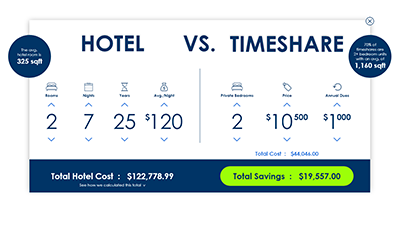No matter how steep the closing costs were on your timeshare, the problem is they're not deductible for tax functions. Legal fees are also ineligible for a write-off. What about providing your problem. err, timeshare away to charity? If you donate it, you will be qualified for a tax refund in the quantity of your home's reasonable market value. To be sure your claim flies with the IRS, you'll need to have an independent appraisal done and keep that documented. Or let's state you simply wish to get rid of your timeshare however aren't sure you want the inconvenience of assessing it for a donation.
You'll desire a business that tries to find legal and ethical methods to get you all the method out of your agreement for excellent. And, of course, you'll want to deal with a group that's very knowledgeable about the laws around timeshares and knows your consumer rights. Timeshares have a lot of rules and regulationsespecially in the tax realm - how to get out of your timeshare on your own. To be sure you get the tax help you require and the cash you should have, you'll desire to connect with one of our Backed Regional Providers (ELPs) in your area for tax aid today.
A timeshare home is a villa that several people own together and share the use of. For example, 50 people might each have a one-week timeshare in a condo in Hawaii (2 weeks are normally left uninhabited for maintenance). In the United States, people who acquire timeshares usually get legal title to their timeshare with their name on the deed in addition to the other owners of the timeshare system. Buying a timeshare in Hawaii or another resort location can appear like a terrific concept in the beginning, but can end up being not so fantastic. Maintenance and other charges can be considerable and can increase in time.
Many timeshare owners want to offer their interests, which they are lawfully entitled to do at any time, simply like for any other realty. Sadly, timeshares are nearly constantly cost a loss because (1) they are normally sold initially at inflated costs, and (2) there is a minimal resale market for timeshares. Indeed, numerous people can't sell their timeshares at all and attempt to give them away. If you do handle to sell your timeshare at a loss, can you a minimum of deduct the loss from your taxes? Regrettably, the response is typically no, however there are exceptions.

How Much Are Disney World Timeshare for Beginners
A timeshare is an individual use timeshare if you utilize it practically specifically as a vacation getaway on your own and your household, relatives, and friends, or you left it uninhabited or exchanged its usage with other timeshare owners. Individual use timeshares can be leased to strangers, but for Additional info no more than 2 week annually. Most of timeshares fall under this category. Losses from the sale of a personal usage timeshare are considered to be individual losses and are not deductible at all. End of story. A timeshare will certify as a leasing just timeshare if (1) it is rented at reasonable market price to unassociated parties for 15 days or more throughout the year, and (2) the owners do not personally use the timeshare for more than 2 week each year or 10% of the total days leased, whichever is greater.
The outcome is that individual usage by any owner of a timeshare is considered individual usage by all of the ownersfor example, if you use your timeshare zero days, but the other owners utilize it 300 days, you have 300 days of individual usage - how do you legally get out of a timeshare. This makes it essentially difficult for you to satisfy the fewer-than-15-days or 10% individual usage tests. For this factor, few timeshares that are rented are categorized as rental only timeshares. If a timeshare does certify as rental just, losses incurred on its sale are deductible. A timeshare is a combined use timeshare if (1) it is leased at fair market worth to unassociated parties for 15 days or more throughout the year, and (2) the owners personally utilize the timeshare for more than 14 days per year or 10% of the total days rented, whichever is higher.

When you offer a mixed usage timeshare you need to treat the sale as a sale of 2 separate properties for tax purposes: an individual usage timeshare and a rental timeshare. You assign the sales price and tax basis between the 2 properties in percentage to your rental vs. individual usage. You can subtract any losses you incur from sale of the rental usage part of the timeshare. Example: Sam paid $10,000 for a one-week timeshare in Hawaii that he used personally one-third of the time and leased out the rest of the time. He sells the timeshare for $4,000 (what are the difference types of timeshare programs available for purchase?). He assigns $2,000 of his $6,000 loss to his individual usage and $4,000 to his rental usage.
The $2,000 is a nondeductible personal loss. By the way, the tax law prevents you from converting a personal usage timeshare to a mixed usage or leasing only timeshare before you offer it so you can subtract your losses. When you make such a conversion, the home's basis (expense for tax purposes) becomes the lower of (1) the property's adjusted basis or (2) the residential or commercial property's reasonable market worth at the date of conversion. If, as is typically the case, your timeshare has declined in value, you'll have to utilize the fair market price at conversion as the changed basis. Therefore, when you offer, you will not have any deductible losses.
Not known Factual Statements About How To Rent Your Timeshare
When you convert it to rental usage its resale value is only $4,000. You must use $4,000 as your basis for figuring out any loss when you offer it. You sell the home for $4,000 and understand no loss or gain.
You might own a house that you live in part of the year and rent part of Browse this site the year. If so, prorate the costs you incur in between personal and rental use. Because villa normally get this kind of treatment, the rules you need to follow are referred to as vacation-home rules. If the home is your main home and you rent it out for fewer than 15 days throughout the year, you don't need to https://emiliodycx438.mozello.com/blog/params/post/3517921/not-known-details-about-what-is-timeshare-property report earnings. However, you can't subtract expenses connected with the rental. You can, nevertheless, claim the typical property owner reductions for: Mortgage interest Real-estate taxes Casualty losses If you rent the home for 15 days or more, report the rental earnings on Schedule E.